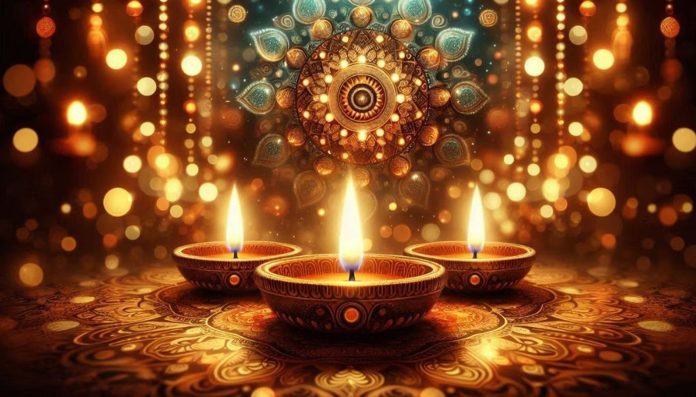Suman K Sharma
“‘Diwali’, or Deepavali, means a row of lamps. It is a public expression of joy.Lord Ram was the eldest son of King Dashrath of Ayodhya. Everyone liked him. But his stepmother, Queen Kaikeyi, asked her husband to banish him to the forest for 14 years. Obeying his father, Lord Ram went away to live in the forest. His wife, Sita, and younger brother Lakshman, were also with him.Ram defeated Ravan who had abducted Sita. When his exile ended, he returned to Ayodhya, along with his wife and brother. The people were happy to have them back. Illuminating their houses with diyas, they celebrated the occasion. We observe the Diwali festival every year in the memory of that glorious event…”
If today a lower school child writes something like that on the festival of Diwali, it signifies a connect between the ‘digitally native’ gen-z and Ram of the treta-yug. Look around yourself. Preparations for the Diwali are being made since the beginning of the month itself. The festival is indeed a validation of Ram’s story and its everlasting relevance to our lives.
One of the important tasksof the Diwali preparations is a thorough housecleaning – a ritual that calls for the cleansing of our minds as well. All the garbage is thrown out, along with the dirt and dust that gets deposited over the year in the nooks and crannies in and around us. The cleaner we are in body and mind, the happier would be the festival.
Let us go back to the time when Ram was about to be anointed. King Dashrath had made up his mind to proclaim him his crown prince. He could not have made a better choice. Aside from being the eldest son, Prince Ram demonstrated valour, wisdom, learning, humility and a staunch support of the public-all the qualities that could be expected of a ruler. The king also received unanimous endorsement of his decision from his courtiers and other important personages. Then he informed Kaushalya, his chief queen and Ram’s mother, of his decision. And with that began elaborate preparations for bedeckingthe entire kingdom for the grand ceremony of investing Ram with the crown prince’s title. Our own national celebrations would have appeared lacklustre in comparison.
Thus far, everything seemed to have gonewell. Then, on the penultimate day, the proud king had to eat his words. Ram had to be banished to jungle for the crown to be passed on to his step-brother, Bharat. The consequences were appalling. The royal trio of Sita, Ram and Lakshman faced the hardships of the wilderness. Sita was abducted by Ravan and carried off to Lanka as a captive. A war ensued, resulting in countless killings and mutilations. King Dashrath himself died of grief soon after the two of his sons and a daughter-in-law had left for the jungle. As for Bharat, the conscientious prince refused to take the place of his older brother. Instead, during the entire period of 14 years of Ram’s banishment, he performed the duties of a regent living as a hermit in a hut at Nandigram, some miles away from Ayodhya.
What had gone wrong? It is customary to lay the blame at Queen Kaikeyi’s door for those sad and sombre days of Ayodhya. The truth, it appears, is different. The prime cause was old Dashrath himself. He forgot to carry out the primary task of cleansing his own mind before going in for the big spectacle of Ram’s anointment. While sending invitations to the neighbouring rajas and chieftains for the ceremony, he omitted to send for two very important dignitaries – Sita’s father, Raja Janak, and his own father-in-law, (Kaikeyi’s father) Raja of Kaikey (see Balmiki Ramayan, Ayodhya Kand, Canto 1-xlvi and xlviii). Significantly, at that time, Queen Kaikeyi’s son Bharat was staying with Shatrughan in the kingdom ofKaikey, as his uncle’s guest. Dashrath went on to privately share with Ram his uneasiness over Bharat:
“Till the time Bharat is with his uncle, away from this city, I think it would be fit to have you anointed.
“There is no doubt that your brother Bharat is firm in his conduct and behaviour of worthy men:he obeys his elder brother, is religious, kind and someone who has control over his senses; yet the minds of men are often unstable – it is my opinion. O,Scion of the Raghus, even the minds of righteous and worthy men get mixed up with love and hatred et cetera.”
– Ibid, Canto 4 – xxv-xxvii
Dashrath’s mind was muddled with ambiguity about Bharat even as he was set to proclaim Ram as his heir. He did not want his second son to be present at the ceremony. The king omitted to inform even Bharat’s mother, Kaikeyi, his favourite queen, who was present in Ayodhya itself. She came to know of Ram’s impending anointment only through her maid-servant, the hunchback Manthara, and that too, after the lapse of full fourteen days of the king’s momentous decision. Had Dashrath taken pains to rid his mind of the garbage of negativity, he could have avoided all the misery that he brought on himself and those close to him. But then we would not have got the Ramayan!
Now compare this with Ram’s triumphant return to Ayodhya after the 14-year van-vaas. Everyone there had gone through catharsis. Kaikeyi, the ill-famed spoiler, had realized her mistake. There was no rancour against her in the minds of her co-wives Kaushalya and Sumitra. Even Ram and Sita paid to her the same respect as they had for Queen Kaushalya. Bharat had proved his absolute loyalty to Ram. The subjects were overjoyed to have their hero back with them. No ceremony could have been happier for them than that.
Diwali tells us something very important: we cannot really be happy till we have done a thorough job of housecleaning.
Trending Now
E-Paper


